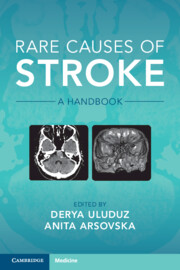Book contents
- Rare Causes of Stroke
- Rare Causes of Stroke
- Copyright page
- Contents
- Contributors
- Preface
- 1 Inflammatory Conditions
- 2 Infectious and Postinfectious Vasculitis
- 3 Hypercoagulable Causes of Stroke
- 4 Drug-Related Stroke
- 5 Hereditary and Genetic Causes of Stroke
- 6 Rare Causes of Cardioembolism
- 7 Vasospastic Conditions and Other Vasculopathies
- 8 Other Non-inflammatory Vasculopathies
- 9 Venous Occlusive Conditions
- Chapter 9.1 Cerebral Venous Sinus Thrombosis
- 10 Bone Disorders and Stroke
- Index
- References
Chapter 9.1 - Cerebral Venous Sinus Thrombosis
from 9 - Venous Occlusive Conditions
Published online by Cambridge University Press: 06 October 2022
- Rare Causes of Stroke
- Rare Causes of Stroke
- Copyright page
- Contents
- Contributors
- Preface
- 1 Inflammatory Conditions
- 2 Infectious and Postinfectious Vasculitis
- 3 Hypercoagulable Causes of Stroke
- 4 Drug-Related Stroke
- 5 Hereditary and Genetic Causes of Stroke
- 6 Rare Causes of Cardioembolism
- 7 Vasospastic Conditions and Other Vasculopathies
- 8 Other Non-inflammatory Vasculopathies
- 9 Venous Occlusive Conditions
- Chapter 9.1 Cerebral Venous Sinus Thrombosis
- 10 Bone Disorders and Stroke
- Index
- References
Summary
Cerebral venous sinus thrombosis (CVST) is the thrombosis of dural sinuses and deep and/or superficial cerebral venous system. Sex specific risk factors in women such as oral contraceptive use, pregnancy and hormone therapy seem to be associated with increased risk of CVST. We present a 24 year-old female, primigravida, that was admitted to the emergency department with a generalized tonic clonic seizure two weeks after normal vaginal delivery and left sided weakness. She reported a severe headache in the previous three days, nausea and vomitting. Cortico-subcortical areas of higher signal intensity in bilateral parietal and left frontal regions with no arterial distribution were observed in the brain magnetic resonance imaging (MRI). Cranial MR venography revealed venous thrombosis in the anterior two thirds of the superior sagittal sinus. The patient was diagnosed as cerebral venous sinus thrombosis due to puerperium and treated with heparin transitioned to therapeutic oral warfarin. During her hospital stay in the fourth day she had another generalized tonic clonic seizure. Levetiracetam was initiated with an optimal dose of 1000 mg/daily. She was discharged with full recovery
Keywords
- Type
- Chapter
- Information
- Rare Causes of StrokeA Handbook, pp. 331 - 335Publisher: Cambridge University PressPrint publication year: 2022



